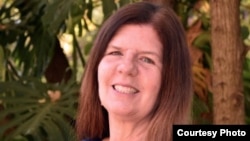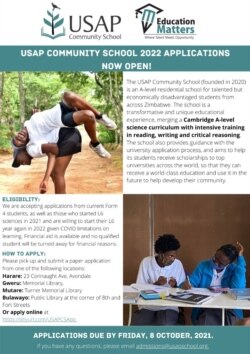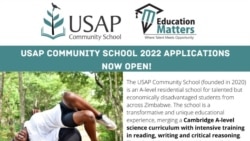The United States Student Achievers Program (USAP) Community School is accepting applications from Lower Sixth and Form Four students to begin their studies in January next year.
Rebecca Mano, director of Education Matters, a non-profit organization, says students should submit their applications by October 8, 2021.
“We have two ways in which people can apply. They can apply on a link online and they can also apply through a paper form and our paper forms are available at public libraries in Bulawayo, Mutare, Gweru and our office at the Education Matters office in Harare. So, people can still come pick up our traditional paper forms and the forms are also PDF and can be WhatsApped or the forms can be accessed online.”
Education Matters is currently doing a nationwide campaign to get as many applications as possible in an effort to help less-privileged children.
Mano says they are also reachable on WhatsApp (0771021511).
The school is also accepting applications from students who started their Lower Sixth sciences this year and are willing to re-start lessons in 2022, given COVID-19 limitations on learning. Mano says the program is for determined and talented, economically-disadvantaged students in Zimbabwe, who lack financial resources.
“We are on a sliding scale need-based financial aide model. So, what that means in simple terms is that students do pay some fees that they can afford usually comparable to what they were paying at their previous school and we fundraise for the rest of the costs.
“We do not turn away any students for financial reasons. We are meet the students where they are and their families contribute what they can afford towards their fees.”
The USAP program, which transitioned into an Advanced Level school, started in 1999 and has successfully assisted over 450 students in the last 21 years to negotiate and finance the college admissions process.
Alumni of the USAP program have studied at some of the world’s top most universities and many have continued to post graduate degrees and prestigious fellowships, while others have pursued various professions across the world, including some leading impactful initiatives in Zimbabwe and in Africa.







